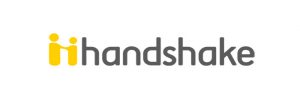 This summer, the Career Center is transitioning to new online career platform, Handshake. Those of you returning to campus should be relieved to know that Handshake is replacing I-Link, the jobs search database that the U of I had previously used to connect students to employers. Handshake is in every way an improvement over what came before: it’s structured around skills, not majors or departments, and it’s much easier to shape to your interests.
This summer, the Career Center is transitioning to new online career platform, Handshake. Those of you returning to campus should be relieved to know that Handshake is replacing I-Link, the jobs search database that the U of I had previously used to connect students to employers. Handshake is in every way an improvement over what came before: it’s structured around skills, not majors or departments, and it’s much easier to shape to your interests.
A few things that English and Creative Writing majors should know about Handshake:
- This resource will be helpful to you, no matter where you are in your education, so take some time this summer to log on and start checking it out.
- It’s a good idea to start building your profile. Employers use Handshake to seek out students, and they will be able to find you more easily if your information is online.
- If you’re looking for work experience while you’re on campus, Handshake lists local part-time jobs and internships, many of which do not appear on the Virtual Job Board or the Research Job Board. Click “Jobs and Internships” and set the filter to “part-time” with a location of Champaign, IL. There are also some unpaid internships listed there, but think hard about the conditions under which you are willing to work for free.
- If you’re NOT looking for a job or internship now, Handshake can help you with your career exploration. Every student can see every job on the site, depending on how far you are willing to scroll. Handshake will order job openings to reflect the information in your profile, so that the jobs that appear first will vary from student to student. This customized list of openings is a great resource for figuring out what kinds of jobs appeal to you and what you’ll need to do between now and graduation to demonstrate your “fit” for them. You can start learning about potential careers and companies by not only reading a lot of job ads, but also bringing to your reading the same critical and self-reflective eye that you bring to your academic work.
Some advice about completing your Handshake Profile:
- If you have a resume, you can upload the most recent and comprehensive version to Handshake to populate your profile. If you don’t have a resume, it can be helpful to create one as you fill out the profile, which automatically gives you a template for the kind of information to include.
- Resist the temptation to fill the “Description” text boxes with large chunks of prose. Most employers find bullet points more readable. If you compose this resume information in Word and then copy/paste to Handshake, the formatting will be a lot easier.
- In the right-hand side bar of the profile, you are urged to list your skills. Go ahead and do that—and use the bullet points in your “descriptions” to demonstrate where and how you’ve used those skills. Anyone on Snapchat can claim “social media” as a skill, for example, but your mention of that skill means a lot more if the description of your work for a student organization also says, “Posted at least 5/week to Instagram or Twitter to publicize [service organization’s] events.”
- Take as much care in documenting your activities as you do your paid work experience. Service projects, student organizations, unpaid internships, and the like are an important part of your profile. Employers know that those experiences build the skills they’re looking for.
- Make full use of the “Projects” category for meaningful creative, independent, or course-related work you’ve done.
- If you’re a freshman or sophomore, a lot of the material you include in your Handshake profile may date from high school. That’s inevitable and okay, but be proactive in looking for ways to replace those items with college-level experience. By the time you’re a junior or senior, all high school experience should be long gone from your resume and Handshake.
- Note that you also have the option of uploading a resume as a freestanding document. Keep this feature in mind when you are applying for a particular position through Handshake . An employer is always going to find a resume customized to their needs more relevant than your all-purpose profile. Your post-graduation job search strategy will involve many different ways of packaging your experience and reaching out to potential employers, so it’s good to be ready.
As always, feel free to contact Kirstin Wilcox, Director of Internships, at kwilcox@illinois.edu if you have questions about figuring out what happens after you graduate.
